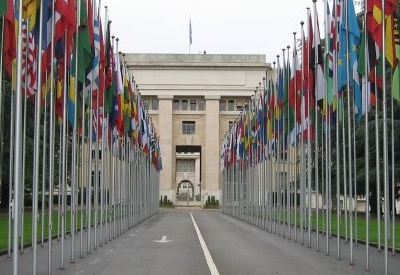Recent events concerning China, America, and COVID -19 - March 26, 2020.
 |
| Commuters in Beijing's business district. Photographer: Qilai Shen/Bloomberg |
Chinese officials have lambasted American representatives for insisting on characterising the coronavirus as a "Wuhan virus" both as a joint declaration from the G7 and at the UN. Indeed, U.S. Secretary of State, Mike Pompeo continues to pursue this language that has resulted in a war of words between Chinese and American officials. Chinese officials have responded as reported by Josh Lederman of NBC...
"We are astonished by the choice of the United States to use this opportunity for politicizing the outbreak and blaming China, which we strongly oppose," China's mission to the U.N. wrote. "The groundless accusations and malicious fabrication from the U.S. aim at shirking its own responsibilities, which severely poisoned the atmosphere of global cooperation in containing the outbreak."
The G7 leaders appear divided on the COVID - 19 issue that strengthens Chinese officials claims against the U.S. while further demonstrating their argument that the U.S. is thwarting the international community in managing the outbreak in a more expedient manner. Chinese officials are side-stepping the origin of the virus as they seek to foster confidence in the Chinese economy that has dropped precipitously due to the U.S. - China trade imbroglio and a general softening of the economy. Chinese net exports accounted for 11%of economic growth in 2019, while economists have modified their economic estimates at levels not seen since 1976 and the Cultural Revolution. Reuters: Stella Qiu, Ryan Woo. "China's factories reopen, only to fire workers as virus shreds global trade." 26 March 2020.
Bloomberg reports on March 25 that, according to Australia and New Zealand Banking Group, the February job loss figures indicate that 8 million people were affected by job losses. The central government is trying to put a positive spin on the situation to stem the bleeding of the virus aftermath. The true impact remains to be seen with the U.S. a tinderbox as the death toll continues to rise: 223 deaths were reported today compared to 326 total deaths as of Sunday morning the 22nd of March, as reported by CNN. Italy remains the hardest hit region outside of China with 7,503 fatalities with Spain rising rapidly to 3,647 deaths from COVID - 19. One has to question China's failure to contain the coronavirus in the 16 year period since SARS - also, a coronavirus. Chinese officials appear to not have learned from that outbreak to modify their protocols on disease control. Secondly, the Trump Administration is culpable in the Wuhan crisis by cutting staff from approximately 47 to 14 staff members at the Beijing office of the U.S. Centers for Disease Control and Prevention (CDC) according to public CDC documents viewed by Reuters. The CDC has worked in China for 30 years.
China has a Belt and Road Summit scheduled for September 9 - 10 in Hong Kong. Will the coronavirus and the protest movement derail the Summit and affect the opening of the event? With all of the afforementioned drama, this might be a repeat of the Seattle Convention that opposed globalisation in 1999 that was sponsored by the World Trade Organization (WTO.) China has a lot on the line and is hoping for a cessation of the pandemic, though, the central government might find a diversion in the South China Sea where it continues to take an aggressive stance to frame ts dominance in the region opposite American Freedom of Navigation Operations (FONOPS.) Today, U.S. Defense Secretary Mark Esper announced that a "stop movement order" is effective for U.S. military personnel for the next 60 days to stop the spread of the virus from military personnel returning home. This might be an opportune time for Chinese officials to step up their game in the region while American personnel are "napping." Might China employ an incursion into Malaysian, Filipino, or Taiwanese territory, while the U.S. is in a temporary stay, remains to be seen. Japan, Australia and others can gain much needed points if they expand their presence in the region during this period. And, can the U.S. - China trade agreement gain any traction despite COVID - 19? President Trump is facing a revitalized Joe Biden who seems like the de facto Democratic candidate at this point and who is sure to make the point that the benefits of Mr Trumps tax cuts have evaporated. Remember the classic Clinton (Paul Begala/James Carville) campaign line: "It's the economy stupid." Trump is vulnerable as is Chinese President Xi Jinping, who is facing a deteriorating economy and whispers about his leadership prowess. A mishap in the South China Sea region may deliver both leaders a much needed diversion apart from what is ailing their respective nations.




